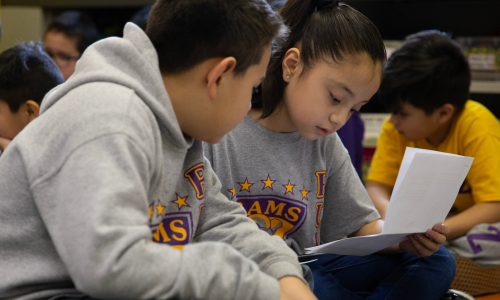
Black History Month began in 1926 as Negro History Week, an event hosted by the Association for the Study of Negro Life and History. By the late 1960s, the annual event transitioned to a month-long celebration, a result of the Civil Rights Movement. It was officially recognized in 1976 by President Gerald Ford.
Today, we mark Black History Month with lectures, concerts, discussions, acts of service, and more. It’s a great opportunity to celebrate the legacies and contributions of African Americans, past and present, and inspire the next generation of leaders in your classroom.
I’ve compiled a collection of resources and ideas to share with your students, their families, and fellow educators, too. Let’s count it down, shall we?
5 books for your classroom library
- What is Hip-Hop? by Eric Morse, with illustrations by Anny Yi (ages 5–adult). The biographies of hip-hop legends throughout history, written in rhyming verse, are complemented by bold, colorful, clay figure illustrations. This book is a must see.
- My Fade is Fresh by Shauntay Grant, with illustrations by Kitt Thomas (ages 3–8). Readers take a trip to the barbershop as a young girl sits down in the chair with a request for the freshest fade.
- Little Leaders: Bold Women in Black History written and illustrated by Vashti Harrison (ages 6–12). Short biographies of more than three dozen amazing women in Black history are paired with illustrations that are child-friendly and delightful.
- Duke Ellington: The Piano Prince and his Orchestra by Andrea Davis Pinkney, with illustrations by Brian Pinkney (ages 8–10). This biographical picture book tells the story of Duke Ellington through lyrical, jazz-like prose. The book also includes additional resources to learn more about Ellington’s life.
- The Cost of Knowing by Brittney Morris (ages 13–18). A Black teen has the power to see into the future, but when he sees tragedy strike, it’s a race against time to save someone he loves.
4 things to watch (with or without your students)
- Hidden Figures (ages 10–adult). The true story of three Black women in STEM who worked for NASA in the 1950s and ’60s. It’s critically acclaimed and inspiring, and it has a great soundtrack to boot. Watch the trailer.
- 13th (ages 16–adult). This documentary looks at the history of the criminalization, over policing, and mass incarceration of African Americans following the 13th Amendment, which abolished slavery. Watch the trailer.
- Glory (ages 16–adult). This unforgettable film tells the true story of the 54th Massachusetts regiment, the first all–African American Regiment to fight in the Civil War. Watch the trailer.
- Pushout (adults). This feature-length documentary, best reserved for educators and parents, examines the societal, racial, and judicial disparities facing Black girls in the classroom. By ignoring or diminishing their humanity, many adults are over disciplining Black girls and criminalizing them simply for being themselves. Watch the trailer.
3 things to listen to
- Black History Month playlist by the National Museum of African American Music. A collection of hits, deep cuts, and true classics from multiple genres of popular music. (A few of the songs include profanity, so be mindful if you share this with a younger audience.)
- 1619, Episode 1: The Fight for a True Democracy. The 1619 Project, by The New York Times, asks readers to consider an America that begins not in 1776 or 1620, but 1619, the year the first enslaved people arrived on its shores. The print and podcast series explores the consequences of the slave trade and contributions made by African Americans.
- Code Switch, Episode 13: Struggling School, or Sanctuary? There are lots of factors that lead to school closures, from finances and low population to a lack of academic progress. These closures disproportionally impact Black school children. This episode of Code Switch from NPR talks to students, teachers, and policymakers about what can be done. (Another great episode in a similar vein is A Tale of Two School Districts.)
2 things to remember
- Get out and explore. See what your local museums, community colleges, universities, houses of worship, and libraries are doing to honor Black History Month, and encourage your students and families to do the same.
- Do the work. Black History Month is not an open invitation to put your Black colleagues, friends, or students on the spot. If you have questions or things you’re curious about, seek out the answer for yourself first, before inviting Black people to do the emotional labor.
1 way to keep the good going
- Yep, just listen. The very best way to make Black history extend beyond February is to listen and acknowledge the lived experiences of Black people. Model for your students how to “pass the mic” and hold space for people who are traditionally underrepresented. It’s a lesson that will improve their lives and the lives of others for years to come.







